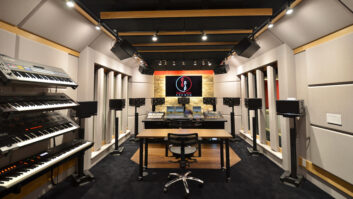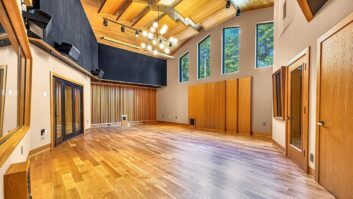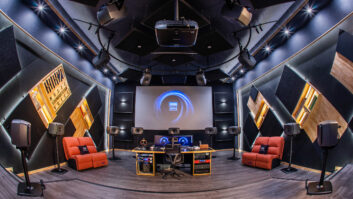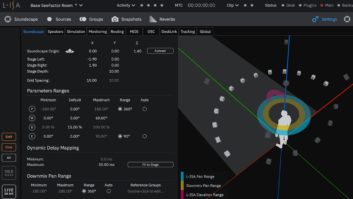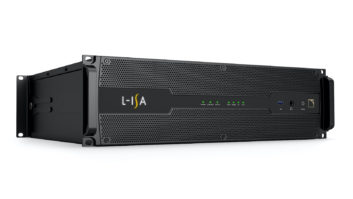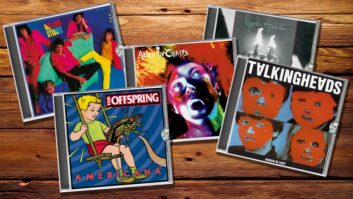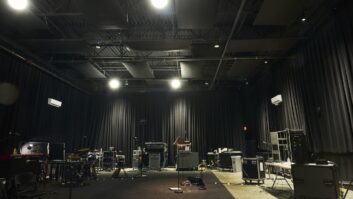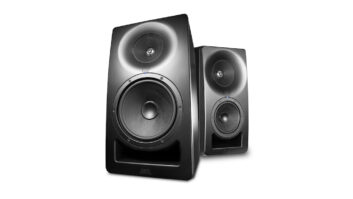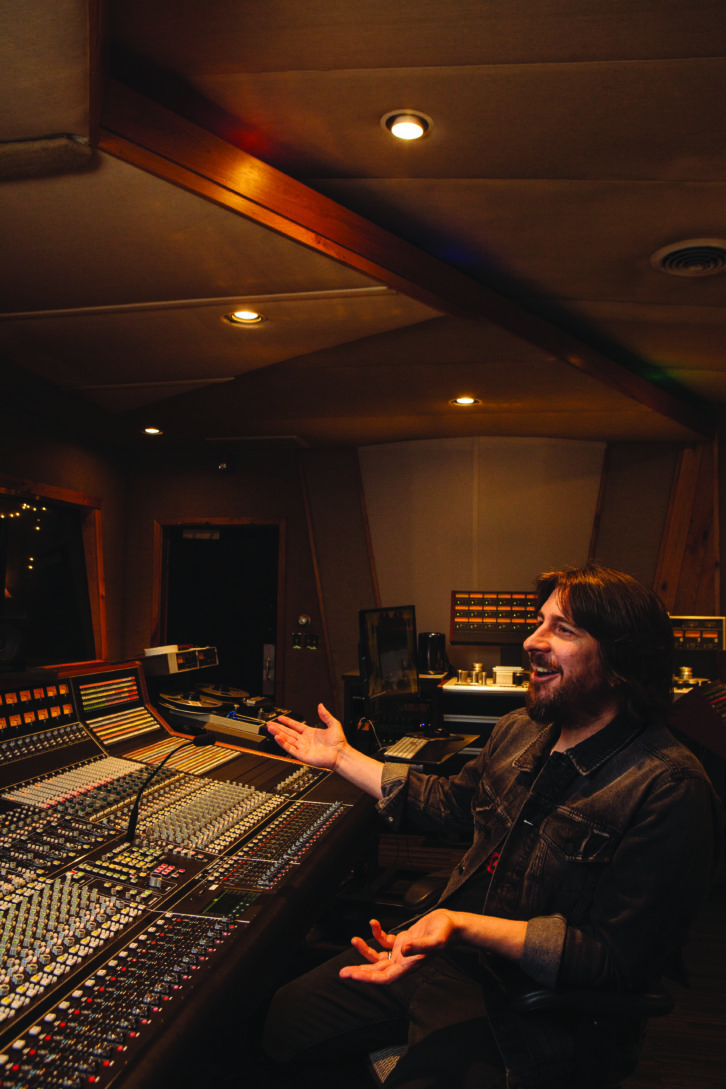
On Nashville’s Music Square West sits a storied facility, RCA Studio A, founded by Chet Atkins with Owen and Harold Bradley in 1965. RCA built three near-identical gymnasium-sized facilities—in Los Angeles, New York and Nashville—designed purposely to record musicians playing together live, from bands to choirs to string sections to full orchestras. RCA Studio A is the last of those rooms standing.
RCA Studio A played no small role in the development of the Nashville Sound and its walls are steeped in the tones of an incredible number of legendary musicians and productions. Toward the end of a dozen-plus year residency in the studio by musician and producer Ben Folds, the building was poised to be sold by the Atkins and Bradley families, destined to face a wrecking ball as a victim of the condo boom in Nashville. Saved by angel investors in 2014 and added to the U.S. National Register of Historic Places in 2014, the room has been leased by musician and producer Dave Cobb since 2016. It was featured on the Mix cover in May 2018.
A Georgia boy, Cobb’s professional career began in Atlanta, where he worked as a session musician, as a band member of The Tender Idols, and had his first credits as a music producer. When the band folded, he continued his career in Los Angeles. “I really planted my feet in L.A.,” says Cobb, adding that there he was taught “better ways to record and make records.”
On Production
“When I got into making records,” Cobb recalls, “the first thing they told me is, you have all these guidelines. You have to do the drums, then you do the bass, then you edit those things, then you add everything else later—the vocals, then background vocals. By the time you get to the vocal, you’re bored as hell of the song. The singer’s not excited. The band didn’t play to them, so there’s no connection between the singer and the track.
“I just found it so much easier to have everyone play together, and you have the singer sing along so if the band gets loud, the singer gets loud,” he continues. “If the singer gets quiet, the band gets quiet; there’s so much dynamic and emotion in tracking together. It’s nice to hear a finished record as you’re tracking it. Artists get excited when they hear it back and it already sounds like an album. Once I figured out you can do that, I never went back the other way, because I just found it so much easier and quicker.”
Cobb relocated to Nashville in 2011, where his recording philosophy matched the legacy production style. Warm-natured with a quiet confidence under a veneer of self-effacing humor, Cobb is a musician’s producer, embodying a participatory production style that would feel familiar and comfortable to the musical ghosts in RCA Studio A.
In early traditional Nashville sessions, the musicians were recorded on no more than three tracks and had to mix themselves and play and blend into a pocket. “We still go with exactly that philosophy,” Cobb reveals. While he “mixes about 60 percent analog,” he’s “absolutely tracking 100 percent analog. It’s so much easier to touch a button than it is to touch a screen.”
Cobb produces with a musician-to-musician level of interaction and communication. “Usually, I’m in the room, playing with the artist’s guitar or sometimes percussion or whatever. And I don’t like to talk about things too much. We’ll sit on the couch; they’ll play the songs. We’ll make some changes, maybe write a theme or something for it. An intro, outro, bridge, something like that, and we move immediately to the instruments and jump on them. And usually, between three takes, you got it. The tape is rolling the whole time, even during the run-through, because that’s when you usually get your best vocal performance.
“With technology, we’re able to do things like use the vocal from the first pass if we need to, to punch in where it went wrong if the band gets better later,” he continues. “But we never miss the emotion of the first pass, we never miss the original intent. That’s the way records feel best to me. You may get the arrangement better later, but you can pop in the original take and use the track from when they first figured out that part or chord, or when the singer first hit a particular note—a bit of magic that never happens again.”
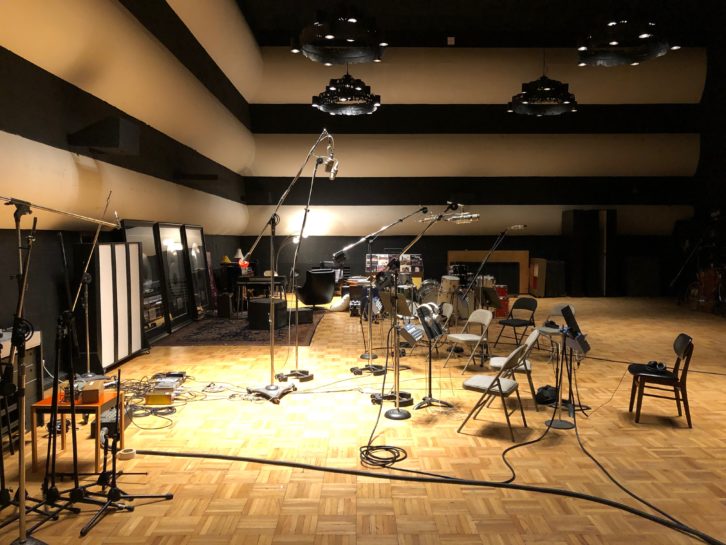
Analog With a Modern Twist
The heart of the RCA Studio A control room is now a new 32-channel, 24-bus API Legacy AXS. “I had a Helios console at my house studio before I took over Studio A,” Cobb says. As he was preparing to move into the facility, where a 1976 vintage API 3232 console was installed in 2010 by Ben Folds, Cobb recalls a client asking him, “You going to buy that console?” When Cobb replied that he was likely going to move in his Helios, the client said, “Oh, you got to buy the console.” When queried why, his client said, “Because it has red, white and blue EQs in it, and I want to make sure that stays.”
The API won Cobb over, despite a few age-induced quirks. “Obviously, we fell in love with it,” says Cobb, calling the 550A EQ sound “incredible.” He adds, only partially in jest, “When I got the new Legacy, really, the big selling point was knowing that I could fit the original red, white and blue EQ’s in this console. I know that sounds really juvenile, but it enabled us to keep the historical sound of the room intact with the modern, tactile abilities of the Legacy AXS that we didn’t have before.”
As a producer/engineer, most of Cobb’s credits are on the producer side. His level of involvement in the recording depends on the session, but “I do wind up mixing 50 or 60 percent of the projects I do,” he says. “I’m mixing more analog since I got this [API Legacy AXS]. It’s fun to be able to spread out on a desk again.”
Unlike the morphing of some console brands over the years, the API sound has remained constant, with reliance on core circuits—a concept Cobb endorses. The first time he heard that sound was on albums from Led Zeppelin and the Rolling Stones that were mixed on API consoles. It’s the sound of “the records I’ve loved historically and the records I love that are still being made.” He says the APIs have a “straight wire sound. Sound comes straight at you. It’s what I recorded; all I have to do is rides. It’s the sound of the all the music I’ve loved, with all the conveniences of today.”
Those conveniences include DAW Control, motorized-fader automation, an in-line design with the ability to track and just flip faders to mix, an onboard patchbay that works, “shiny faders that move,” adequate aux sends and a clean center section, the latter two Legacy AXS features allowing him to “tidy up” his work space by eliminating an outboard monitor controller and headphone mixer that sat atop the vintage desk.
Cobb also cites having the AXS’s six dedicated and automated stereo echo returns as, “probably my favorite thing because I always feel like you’re giving up channels for parallels and reverb returns. I’m riding them like crazy all the time, which is something I wouldn’t probably wind up doing with a console without automation. I think it allows you to be more creative.”
“This is home,” Cobb declares of Studio A. “I don’t rent it out.” For most of his career, he says, he’s worked “six days a week, if not seven. So, I don’t really have time to let somebody else jump in for any reason.
“It’s beyond my wildest dreams to be in a place like this. You walk through those doors you’re walking into another world. I get that feeling every time I’ve walked in there. A day doesn’t go by that I don’t realize how fortunate I am to be here. I definitely feel all the people that came before me here. I got to work here with Dolly recently. She said, ‘This is where we cut “I’ll Always Love You” and “Jolene.”’ It’s just amazing to hear the stories. I feel like it’s a place where you probably should wear a tie to work, and probably stop cussing like a sailor.”
